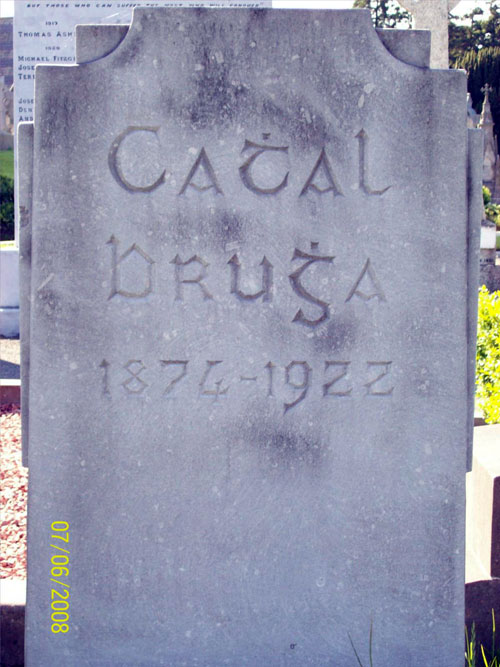Cathal Brugha
Cathal Brugha (Irish pronunciation: born Charles William St John Burgess) (18 July 1874 – 7 July 1922) was an Irish revolutionary and politician, active in the Easter Rising, Irish War of Independence, and the Irish Civil War and was the first Ceann Comhairle (chairman) of Dáil Éireann.
Brugha was born in Dublin of mixed Irish Catholic and Irish Protestant parentage. His father, Thomas, was a cabinet maker and antique dealer who had been disinherited by his family for marrying a Catholic. He was the tenth of fourteen children and was educated at the Jesuit Belvedere College, but was forced to leave at the age of sixteen due to the failure of his father’s business. He went on to set up a church candle manufacturing firm with two brothers, Anthony and Vincent Lalor, and took on the role of travelling salesman.
Brugha organised an amalgamation of the Irish Volunteers and the Irish Citizen Army into the Irish Republican Army (IRA). He proposed a Republican constitution at the 1917 Sinn Féin convention which was unanimously accepted. In October 1917 he became Chief of Staff of the Irish Republican Army and held that post until March 1919. He was elected as a Sinn Féin MP for the County Waterford constituency at the 1918 general election. In January 1919, Sinn Féin MPs refused to recognise the Parliament of the United Kingdom and instead assembled at the Mansion House in Dublin as a revolutionary parliament called Dáil Éireann. Due to the absence of Éamon de Valera and Arthur Griffith, Brugha presided over the first meeting of Dáil Éireann on 21 January 1919.
On 7 January 1922 Brugha voted against the Anglo-Irish Treaty. During the Treaty Debates he pointed out that Collins only had a middling rank in the Department for Defence which supervised the IRA, Arthur Griffith hailed him as ‘the man who had won the war’. It has been argued that by turning the issue into a vote on Collins’ popularity Brugha swung the majority against his own side; Frank O’Connor in his biography of Collins states that 2 delegates who had intended to vote against the Treaty changed sides in sympathy with Collins. He left the Dáil and was replaced as Minister for Defence by Richard Mulcahy. In the months between the Treaty debates and the outbreak of Civil War Brugha attempted to dissuade his fellow anti-treaty army leaders including Rory O’Connor, Liam Mellows and Joe McKelvey from taking up arms against the Free State. When dissidents occupied the Four Courts he and Oscar Traynor called on them to abandon their position. When they refused, Traynor ordered the occupation of the area around O’Connell Street in the hope of easing the pressure on the Four Courts and of forcing the Free State to negotiate. On 28 June 1922 Brugha was appointed commandant of the forces in O’Connell Street. The outbreak of the Irish Civil War ensued in the first week of July when Free State forces commenced shelling of the anti-treaty positions.
Most of the anti-Treaty fighters under Oscar Traynor escaped from O’Connell Street when the buildings they were holding caught fire, leaving Brugha in command of a small rearguard. On 5 July he ordered his men to surrender, but refused to do so himself. He then approached the Free State troops, brandishing a revolver. He sustained a bullet wound to the leg which ‘severed a major artery causing him to bleed to death’. He died on 7 July 1922, 11 days before his 48th birthday. He had been re-elected as an anti-Treaty TD at the 1922 general election but died before the Dáil assembled.

